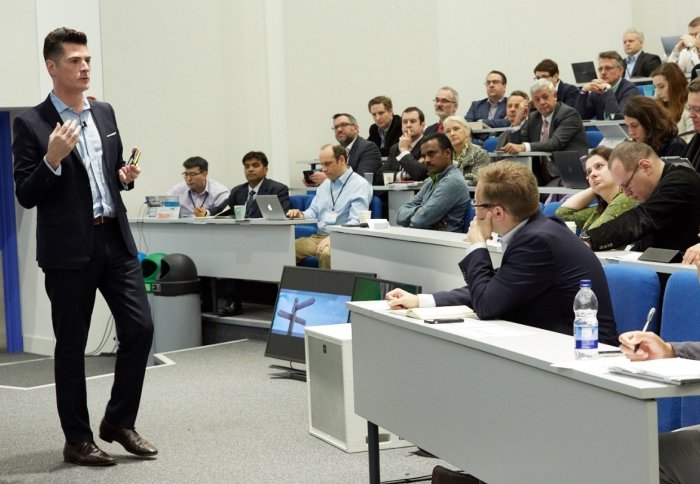Top digital and education talent gathers for Microsoft Summit at Imperial

Microsoft's Anthony Salcito talks with delegates
Higher education and business leaders from over 28 countries explored digital learning innovations at Imperial.
They attended the first Microsoft Campus Connections Summit ever hosted outside of the USA on 10-12 April.
The inspirational line-up of speakers included leaders from Microsoft and Imperial, among other tech, business and education experts. The group examined competing visions for a ‘21st century education’, also taking the chance to explore potential partnerships and collaborations.
Global challenges
“We’re on the cusp of changing everything. We know if we get digital learning ‘right’ we can produce graduates able to overcome a number of seemingly intractable global challenges." Professor Simone Buitendijk Vice Provost for Education
The College’s Vice Provost for Innovation, Professor David Gann, opened proceedings with an overview of Prince Albert’s historic plan for the Exhibition Road Quarter to be a hub of world-class cultural and educational institutions, inspired by Imperial’s founding ethos.
Professor Gann was followed by a keynote speech delivered by the College’s Vice Provost for Education, Professor Simone Buitendijk.
Professor Buitendijk invited the audience to consider the United Nations’ Sustainable Development Goals. From eradicating malnutrition to developing clean energy, the Goals encompass a number of areas in which College staff and students are leading the way with innovative solutions.
Imperial's ambition to transform learning and teaching
As Imperial embarks on a once-in-a-generation plan to transform its learning and teaching, the Microsoft Summit led to multiple related exchanges of expertise.
Several higher education and industry experts commented on the urgent need to replace outdated and ineffectual teaching methods, such as the traditional lecture. Professor Buitendijk repeated this point when she emphasised the opportunities and challenges associated with delivering a true revolution in global higher education: “We’re on the cusp of changing everything. We know if we get digital learning ‘right’ we can produce graduates able to overcome a number of seemingly intractable global challenges.
“Blending the learning experience between the physical and the digital world also provides professionals opportunities to connect and share information. Take for example our Online Masters in Global Public Health, a course designed with diverse, global and professional learners in mind.”

Professor Buitendijk’s presentation highlighted aspects of the College’s own Learning and Teaching Strategy. She said: “Universities need to embrace digital technology to ensure they remain leaders in delivering high quality teaching and research. This is why events of this kind are so valuable in bringing together academics and technology experts to debate the issues and share insights which can benefit everyone.
“From online Master’s degrees such as Global Public Health and the Business School’s Global Online MBA, to MOOCs developed with Coursera and EdX, such as Maths for Machine Learning, Imperial is creating a digital learning experience which enhances the experience of our on-campus students, increases our global footprint in education, and creates global citizens able to use digital technology in professional environments.
"By opening our doors to the Microsoft team we have signalled our willingness to work hand in hand with industry to reach this ambitious future.”
Industry innovations
Professor Buitendijk was joined onstage by Microsoft’s Vice President for Education, Anthony Salcito.
"With the advent of virtual reality and 3D printing it has never been easier for students to test their ideas and create prototypes." Anthony Salcito Vice President for Education, Microsoft
Mr Salcito said: “We know that the best perspectives will emerge from universities. At Microsoft, our mission in education is to empower the students of today to create the worlds of tomorrow. As technology continues to transform workforce expectations, teaching and learning environments, and platforms for ground-breaking research, it is imperative that we discover new ways of working together while mobilising our community around shared goals.”
Mr Salcito particularly focussed on the need for education technologies that continue to bridge the gap between ‘concept and creation’: “With the advent of virtual reality and 3D printing it has never been easier for students to test their ideas and create prototypes. However, we do need to be mindful that new technology is not introduced into the classroom simply for the sake of it. We need to ensure that everything has a purpose.”
A number of Imperial staff members, such as Professor David Dye and David Brown, took part in engaging panel discussions about design thinking skills and students’ employability prospects.
Dr. Alexandros Papaspyridis, Imperial Electrical Engineering & Business School alumnus and Tertiary Education Industry Lead at Microsoft Asia said: “As an Imperial alumnus, I was pleased that Microsoft chose to partner with the College to bring our Campus Connections Summit for the first time outside our Corporate HQ. The universities and Microsoft guests who attended the event enjoyed the presentations as well as the campus tours.”
Article text (excluding photos or graphics) © Imperial College London.
Photos and graphics subject to third party copyright used with permission or © Imperial College London.
Reporter
Murray MacKay
Communications Division